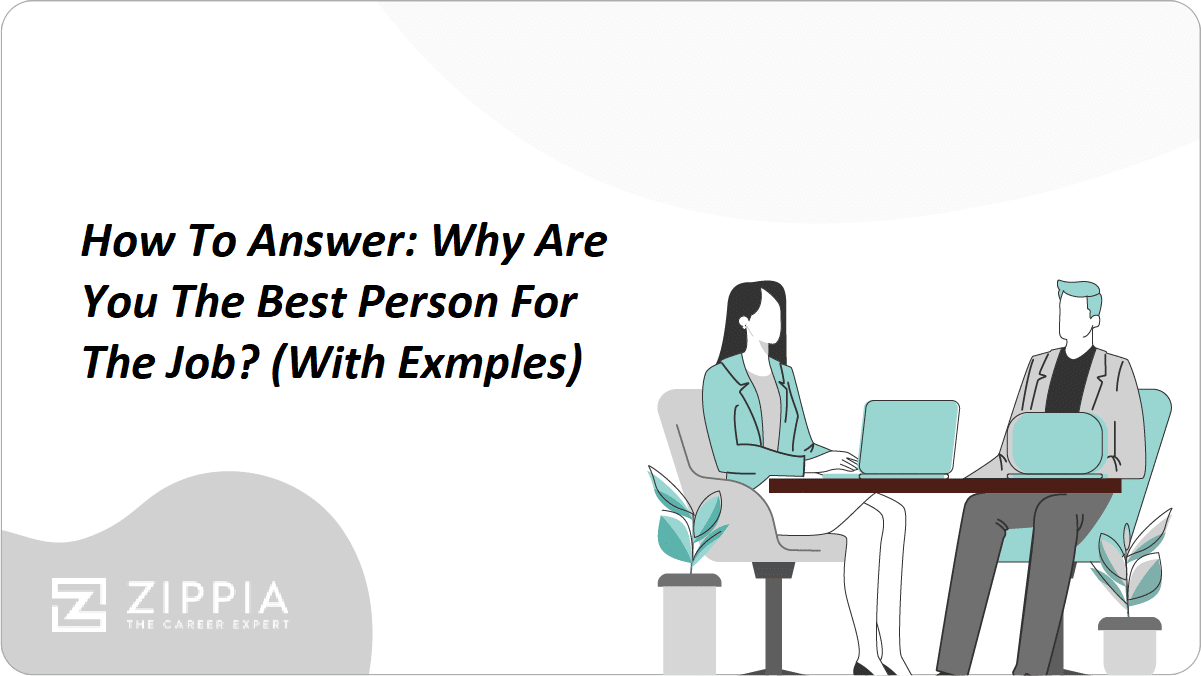- Common Questions
- Interview Questions
- How To Answer Tell Me About Yourself?
- Elevator Pitch
- Where Do You See Yourself In 5 Years?
- What Are Your Career Goals?
- When Can You Start?
- How Do You Define Success?
- Describe Your Work Ethic
- Where Are Your Current Duties?
- What Are Your Learning Goals?
- Intrinsic Vs Extrinsic Motivation
- What Is Your Desired Salary?
- What Makes You Unique?
- Why Are You The Best Person For This Job?
- Reasons For Termination
- What Are Your Work Values
- How To Make A Hard Decision?
- What Are You Most Proud Of?
- Personal Code Of Ethics
- Problem Solving Interview Questions
- Taking Initiative Example
- How Do You Prioritize Your Work
- Explain Gaps In Employment
- Most Rewarding College Experience
- What Is Your Work Style
- Tell Me About A Time When You Made A Mistake On The Job
- Tell Me About Gaps In Employment
- What Are You Passionate About
- What Skills Would You Bring To The Job
- Who Is Your Mentor?
- Tell Me About Gaps In Employment
- How To Answer Tell Me About A Time You Disagreed With Your Boss
- How To Answer Common Screening Questions
- Types Of Questions
- Situational Interview Questions
- Promotion Interview Questions
- Internal Interview Questions
- Open Ended Interview Questions
- Tough Interview Questions
- Leadership Interview Questions
- Teamwork Interview Questions
- Interview Questions About Communication
- Personality Interview Questions
- Internship Interview Questions
- Ice Breaker Questions
- Recruiter Interview Questions
- Brain Teaser Interview Questions
- Group Interview Questions
- Competency Based Interview Question
- Grad School Interview Questions
- Scrum Interview Questions
- Excel Interview Questions
- Common Phone Interview Questions And Answers
- Job Specific Questions
- Why Did You Choose Nursing?
- Why Do You Want To Be A Teacher?
- Why Do You Want To Be A Doctor?
- Why Do You Want To Be A Police Officer?
- Police Officer Interview Questions
- Why Do You Want To Be An Accountant?
- Sales Interview Questions
- Interview Questions For Managers
- Retail Interview Questions
- Teacher Interview Questions
- Accounting Interview Questions
- Teaching Philosophy Examples
- Management Philosophy Examples
- Leadership Philosophy
- What Does Customer Service Mean To You
Find a Job You Really Want In
- Why Interviewers Ask “Tell Me About a Time You Made a Mistake”
- How to Answer “Tell Me About a Time You Made a Mistake”
- Examples of Mistakes Made at Work
- Example Answers For Different Job Titles
- Tips and Examples for Giving the Best Answer
- Common Mistakes When Answering “Tell Me About a Time You Made a Mistake”
- Possible Follow-Up Questions
- Sign Up For More Advice and Jobs
During an interview, you might hear “Tell me about a time you made a mistake?” It can be a awkward to response with any past mistake and your answer should walk the fine line between positivity and transparency.
Mistakes happen from time to time, no matter your job title, experience, or industry.
In this article, we’ll discuss the different variables around this specific question, how you should think about answering it, and what it means in an interview.
Why Interviewers Ask “Tell Me About a Time You Made a Mistake”
The question is usually asked to intentionally put you on the spot. The interviewer is looking to understand how you handle both stressful and challenging situations.
Being able to articulate a mistake you made at work shows that you are honest and have integrity. It also shows that you are self-aware and can readily admit and take responsibility for your mistakes. Nobody is perfect, and your interviewer knows this.
This is a different variety of the “Tell me about your greatest weakness” question. They’re probing you to tell them where you think you might fall short and how you’re working to overcome this or what you’ve learned from past experiences.
How to Answer “Tell Me About a Time You Made a Mistake”
There are a few different ways to think about this and some of the variables might be different depending on your industry, job title, experience, or specific situation. It’s best to follow these steps when answering this question:
-
Don’t play the blame game. Outline your mistake simply and avoid blaming teammates, bosses, or the company. We all make mistakes and it’s best to own up to the mistake you made, even if there were others involved.
Pointing fingers and assigning blame makes you look like you’re not willing to take responsibility when things fall apart. To avoid this, open up as much as possible, and take responsibility while addressing the mistake.
-
Don’t stop at the mistake. Once you’ve articulated the specific mistake, you may think your answer to the question is finished. But this is false, as mentioned above, your potential employer isn’t looking for the specific mistake you made, but rather how you handled it.
Don’t leave your interviewer with a vague solution to the mistake. Instead, get specific and describe the actions you took to resolve the errors.
-
Mention the positive aspects. If the outcome of your mistake ended up ultimately being positive, make sure you mention this as quickly in your answer as you can.
This will show your potential employer that you are able to handle any curveball thrown at you, especially if you’re at fault. Explain to them how you worked to resolve the problem to avoid any further issues.
-
Talk about what you learned. The most important piece of this answer is to articulate what you learned after making the mistake. Discuss the lessons you learned following this particular event and how you incorporated those learnings into your everyday work.
Explain how you avoid these types of mistakes moving forward and show your interviewer how this resulted in your professional growth.
Examples of Mistakes Made at Work
Here are come common mistakes that happen at work that might help you think of the right example to share in an interview:
-
Misunderstanding instructions from coworker, leading to a mistake.
-
Missing a deadline.
-
Losing a customer/client as a sales representative.
-
Mishandling money
-
Not saving your progress on a project and losing the information.
-
Being unprepared for a meeting, causing the rest of the team to be delayed.
Example Answers For Different Job Titles
As mentioned above, the answer to this question may look different, especially for different job titles. Below are some examples of specific job roles and their response to this kind of question.
-
Business Development Example
One of the most important mistakes I ever made in my career was when I struggled to meet my sales goals for the year when I first started in this role. I felt discouraged, but I went to my manager for advice and feedback. He said I needed to get more creative in my follow-ups and not stop with a phone call. I discussed with the marketing team, who helped me craft some monthly emails that I could send as a follow-up to my phone calls. My numbers doubled. I now make sure I am using all of the resources at my disposal to nurture leads.
-
Digital Marketing Manager Example
When I first came into this role, I learned how to manage the marketing automation tool, our social media handles, and began developing new advertisements that we could use. However, our drip campaigns weren’t getting the pull that we wanted and I couldn’t figure out why.
Ultimately, my two first drip campaigns were failures. My manager told me to sit with the data for some time and make sense of it a few different ways. After doing this, I realized I needed to make room every week to analyze and make conclusions from the data we were seeing. Now, data is a crucial part of my job and I don’t make any decisions without having the data to back it up.
-
Human Resources Associate Example
When I interned, I was very shy and didn’t have much confidence. I was terrified to ask questions for fear of bothering busy people. At the end of my internship, my manager told me he didn’t think I learned enough and encouraged me to ask more questions in future opportunities. That prompted me to enter my next opportunity with a different mindset. I now ask a lot of questions which has prepared me well to interview potential candidates and be a better human resources associate.
Tips and Examples for Giving the Best Answer
Since this answer can vary widely depending on many variables, here are some basic tips to keep in mind when crafting your answer.
-
Understand your audience. If you know this question is coming, you’ve got a chance to understand the audience you’ll be interviewing with. Look over the job listing and consider a mistake that might be relevant, but not closely related to the specific job. If you can, try and tie your learnings to how it can make you a more valuable candidate.
-
Put your own spin on it. Don’t forget to end on a positive note. Don’t pick a mistake that wasn’t fixed, pick one that has a positive resolution at the end. Be sure you include your learnings from your mistake and how it will help you avoid similar mistakes at this new job, should you land the opportunity.
-
Review questions and answers. Sometimes you need a starting point to craft an effective response to these types of questions. Look through some common interview questions and consider different answers for all of them. Practicing with a friend can help you be more prepared for your interview and answer the questions effectively.
-
Consider using the STAR interview. With this technique, the interviewee is expected to describe a Situation (S), Task (T), Action (A), and Result (R) to articulate the mistake and situation surrounding it.
This method allows you to provide your interviewer with specific examples that you successfully fixed an error in your work and that you have the correct experience and skills for the job at hand.
When I first became the operations manager at my office, I attempted to take on every single task at once. I worked on the day-to-day operations of the branch, making calls and answering both incoming phone calls and customer visits. Soon, I took on both marketing and sales responsibilities, as well as small financial tasks.
What I found was that I needed to delegate to other individuals who could help me with the heavy workload. Since then, I have learned how to better manage my employees and direct them towards tasks instead of taking them on myself.
This response works well because it demonstrates how the candidate can learn from challenging responsibilities and adjust their working methods to fit the tasks at hand. It’s a great example of a mistake that may be initially negative, turned into a positive skill.
Consider this example:
When I first joined my sales team, we failed to land one of our big sales for the quarter. Our executive team told us that it had to do in part with an effective presentation.
Over the next few months, I worked closely with the marketing team to develop an engaging sales presentation that both resonated and offered value to our potential clients. Six months later, we landed the client with that presentation.
This is another great response to this question. It shows that the candidate is open to honest and critical feedback and willing to work through it. Not just that, but they’re willing to work cross-functionally for the good of the sales team, the company, and the client. It highlights both the desire to learn and dedication to the team and company.
Common Mistakes When Answering “Tell Me About a Time You Made a Mistake”
There are all kinds of different ways to respond to this question, but there are a few common mistakes you should consider before heading into your interview. You want your response to be honest, but not too honest, while still maintaining all of the credibility you’ve built during your interview. In order to do this, it’s best to pay attention to the following:
-
Don’t appear dishonest or unrealistic. Responding to this question with “I’ve never made an error or mistake at work,” is not the answer your interviewer is looking for. Saying that will make you appear egotistical and dishonest.
-
Don’t choose a trivial mistake. Telling your potential employer that you forgot to take the trash out one day is the wrong one to pick here. Be sure you choose a real mistake that had consequences. If you choose an incident that doesn’t actually count as a mistake, this could turn your employer off and damage your credibility.
-
Don’t gloss over. Try to avoid speeding past the mistake or even worse, trying to give justifications for why it happened. Take responsibility for your mistake and discuss it head-on, even if it’s uncomfortable.
-
Avoid damaging mistakes. Being honest is encouraged, but it’s best to leave out disastrous mistakes that could damage your prospects. Think about the mistake you want to discuss carefully and make sure it’s appropriate in an interview.
-
Don’t throw anyone under the bus. When talking about a mistake, don’t brush over it and put all the blame on a coworker or team member. It will make you look like you don’t take responsibility for mistakes. Instead try to tell how you worked together to fix the mistake.
Possible Follow-Up Questions
Telling your potential employers about a mistake you may have made isn’t the only common question you’ll get in your interview. Your interviewer may have follow-up questions that result after your discussion of this mistake. Consider them carefully to come up with sample answers, in case they are asked. Some examples of follow-up questions could be:
-
How do you handle a stressful environment?
-
How do you manage multiple projects at once?
-
How do you handle constructive criticism from your colleagues? From management?
-
Tell me about your greatest accomplishment at work.
- Common Questions
- Interview Questions
- How To Answer Tell Me About Yourself?
- Elevator Pitch
- Where Do You See Yourself In 5 Years?
- What Are Your Career Goals?
- When Can You Start?
- How Do You Define Success?
- Describe Your Work Ethic
- Where Are Your Current Duties?
- What Are Your Learning Goals?
- Intrinsic Vs Extrinsic Motivation
- What Is Your Desired Salary?
- What Makes You Unique?
- Why Are You The Best Person For This Job?
- Reasons For Termination
- What Are Your Work Values
- How To Make A Hard Decision?
- What Are You Most Proud Of?
- Personal Code Of Ethics
- Problem Solving Interview Questions
- Taking Initiative Example
- How Do You Prioritize Your Work
- Explain Gaps In Employment
- Most Rewarding College Experience
- What Is Your Work Style
- Tell Me About A Time When You Made A Mistake On The Job
- Tell Me About Gaps In Employment
- What Are You Passionate About
- What Skills Would You Bring To The Job
- Who Is Your Mentor?
- Tell Me About Gaps In Employment
- How To Answer Tell Me About A Time You Disagreed With Your Boss
- How To Answer Common Screening Questions
- Types Of Questions
- Situational Interview Questions
- Promotion Interview Questions
- Internal Interview Questions
- Open Ended Interview Questions
- Tough Interview Questions
- Leadership Interview Questions
- Teamwork Interview Questions
- Interview Questions About Communication
- Personality Interview Questions
- Internship Interview Questions
- Ice Breaker Questions
- Recruiter Interview Questions
- Brain Teaser Interview Questions
- Group Interview Questions
- Competency Based Interview Question
- Grad School Interview Questions
- Scrum Interview Questions
- Excel Interview Questions
- Common Phone Interview Questions And Answers
- Job Specific Questions
- Why Did You Choose Nursing?
- Why Do You Want To Be A Teacher?
- Why Do You Want To Be A Doctor?
- Why Do You Want To Be A Police Officer?
- Police Officer Interview Questions
- Why Do You Want To Be An Accountant?
- Sales Interview Questions
- Interview Questions For Managers
- Retail Interview Questions
- Teacher Interview Questions
- Accounting Interview Questions
- Teaching Philosophy Examples
- Management Philosophy Examples
- Leadership Philosophy
- What Does Customer Service Mean To You





